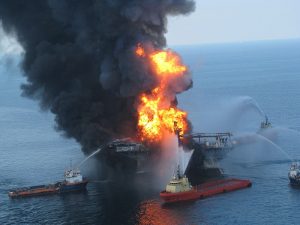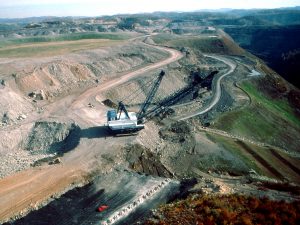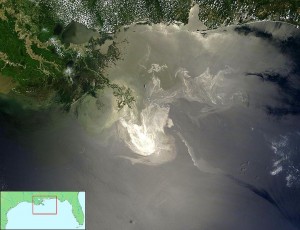Our Collective Voice
By Jillian Randel
Upon returning from a visit to the so-called “Coalfields”, author and activist, Terry Tempest Williams commented, “Just when you thought you can’t see anything worse than the Gulf Oil Spill, we went to Coal River Valley and I was shattered.”
Today marks the one year anniversary of the explosion aboard the Deep Water Horizon drilling rig, also known as the “BP Oil Spill”. Calling it a ‘spill’ now seems too easy — it sounds like a small child tipped over a glass of milk, Ooppps! A spill! But this was no spill, it was a disaster, an ecological genocide, and when I say ecological, I include humans as part of this equation.
Tempest Williams’ comment was in no way a means of undermining the enormity of the oil spill and its devastation. I believe the imagery she meant to evoke was of the daily genocide that corporations are taking on our lands all across the U.S. — communities now suffer the effects of natural gas drilling (hydraulic fracturing), mountaintop removal coal mining (the process by which companies blast the tops off mountains and dump the debris into adjacent valleys), and the disastrous effects of oil drilling, are among the most destructive assaults. We wreak havoc on our environment daily and the communities who happen to suffer from this, well, they’re just collateral damage, right?
Wrong.
It is my right as a citizen to have clean air and clean water, and so it is for every citizen on this planet. Social and economic status does not change this, religious affiliation does not change this, zip code does not change this, color of skin does not change this.
The long-term effects of the oil spill still can’t be measured, nor really, can those of mountaintop removal. I see many parallels between the two issues and looking at most environmental and human health problems, the end result will be the same — the profits of large corporations trump all. Here is a brief comparison list below:
On the Gulf/In the Coalfields
– In the year 2010, CBS News found a minimum of 6,500 oil spills, leaks, fires or explosions nationwide — that’s 18 a day. Those are limited to the number of reported incidents, and one could reasonably assume that there are many other spills that go unreported.
-In less than 3 decades, mountaintop removal coal mining has destroyed over 500 mountains, buried and polluted over 2,000 miles worth of headwater streams and destroyed 1.2 million acres of Appalachia — an area the size of Delaware.
On the Gulf/In the Coalfields
-5 million barrels of oil contaminated 580 miles of marshes and coastline, threatening and endangering four hundred species of wildlife — pelicans, ibis, egrets, sea turtles, shrimp, crabs, shark, dolphins and oysters to name a few. The U.S. Fish and Wildlife Service estimates that over 7,000 birds, sea turtles, whales and dolphins have died in the Gulf in the past year and many say this number is grossly underestimated.
-The Appalachian Mountains are home to the largest variety of life of any eco-region in North America, and it is one of the most biodiverse regions in the world. The mixed mesophytic forests are one of the most ancient forest ecosystems on the planet. Blasting from mountaintop removal destroys entire ecosystems in the region.
On the Gulf/In the Coalfields
-Congress has failed to raise the $75 million dollar liability cap for oil companies, meaning that taxpayers are still on the hook for cleanup costs that rise above that cap; the Gulf Oil Spill has cost billions of dollars.
-Congress has failed to pass the Clean Water Protection Act or the Appalachian Restoration Act, both aimed at stopping the dumping of mining waste into our waterways and making it harder for coal companies to extract coal through blasting.
On the Gulf/In the Coalfields
-Dispersants sprayed over the gulf and surrounding communities (meant to break up the oil) have caused Gulf residents and workers to suffer from short-term problems such as respiratory infections, dizziness, vomiting, ear infections, contact dermatitis, swollen throat, declining eyesight, memory loss and other illness. According to the Center for Disease Control and Prevention, long-term exposure to dispersants can cause central nervous system problems and damage blood and organs such as the kidneys and liver.
-Coal dust from extracting and mining processes pollutes the air of nearby communities. It flies off the trucks transporting coal and dusts people’s homes, pets and yards. Coal ash produced from the burning of coal also litters communities located near coal-fired power plants. Residents living in areas that contain either or both types of this ash suffer from higher rates of respiratory illness, cancer, low birth-weight babies and other diseases related to nervous system failure.
On the Gulf/In the Coalfields
-Congress has failed to pass drilling-related measures that would improve worker and environmental safety and the industry still does not have any fail-safe devices for deep water drilling, yet the practice continues. Worse, congress has not stopped offshore drilling since the BP disaster.
– Kentucky’s fifth district, the Congressional district with the most mountaintop removal has the shortest life expectancy and the worst physical well-being, in large part due to the impacts of surface mining in the area. Congress continually fails to pass stricter mine safety legislation since the Upper Big Branch disaster (an incident in 2010 when 29 men were killed), let alone end mountaintop removal.
On the Gulf/In the Coalfields
-The oil spill has left Gulf communities with no source of income. An economy that was based on tourism has seen fewer and fewer visitors, affecting restaurants, hotels and tourist attractions among other businesses. The diminished fishing economy (the fishing industry has slowly collapsed due to “outsourcing” of fish and hit a low in 2000), is now dead as few people trust fish coming out of the Gulf. The moratorium put on off-shore drilling in the Gulf cost an estimated 13,000 jobs in the six months following the spill.
-Despite what proponents of mountaintop removal say, the practice is not good for the economy. It requires smaller crews than underground mining and, after huge layoffs during the 80s and 90s, has left old mining towns in despair. Communities located in and around coal mines have some of the highest rates of poverty and suffer from the worst health conditions in the country.
A Kick to Our Voice
What are we doing to our people in our cry for capitalism and profits? Without trying to be sensationalist, put a face on the term ‘human health’, because it has many faces. This is not a news story, it is not a movie, it is life. This is what is happening: we are poisoning our own people.
During the discussion I attended with Terry Tempest Williams, she led the audience to the question: What can we do? Her answer (in simpler terms) was: We can use our voice, because we all have one.
There is no excuse not to lobby your congressman or woman. There is no reason not to start a letter-writing campaign, to make a trip to your legislators office (and bring 20 other constituents with you); there is no reason not to stand up and demand the change that you not only want, but that is absolutely, unquestionably necessary if we want to have a livable planet for our children.
Sitting by stagnantly while peoples’ lives and our ecosystems are destroyed is not OK. I consider myself lucky to have been born in a zip code that happens to exist in a democracy. I elect my public officials, and that is true for all of my countrymen and women. Yes, powerful corporations can put large sums of money into the hands of some officials, but those large corporations cannot take away the power of our collective voice.
Terry Tempest Williams passed on a message from West Virginia resident and activist Larry Gibson, he said, “Let there be a kick to your voice and let there be a kick to your words.”
Our government is not going to do this for us willingly; we have to make them do this for us. In honor of all those who have died so that we can turn on our lights, so that we can gas up our cars, so that we have heat in the wintertime, it is time that we demand a cleaner energy future.
Our energy consumption should not mean that a seven-year-old girl has to be hospitalized on a regular basis and hooked up to a respirator; it should not mean that a 73-year-old woman should be displaced from her home that she worked and lived her entire life. We all have the power of our actions and our words to create change, so let’s give it a kick and let’s make it a good kick, and let’s not stop kicking until we get what we want.






GREAT post Jillian!